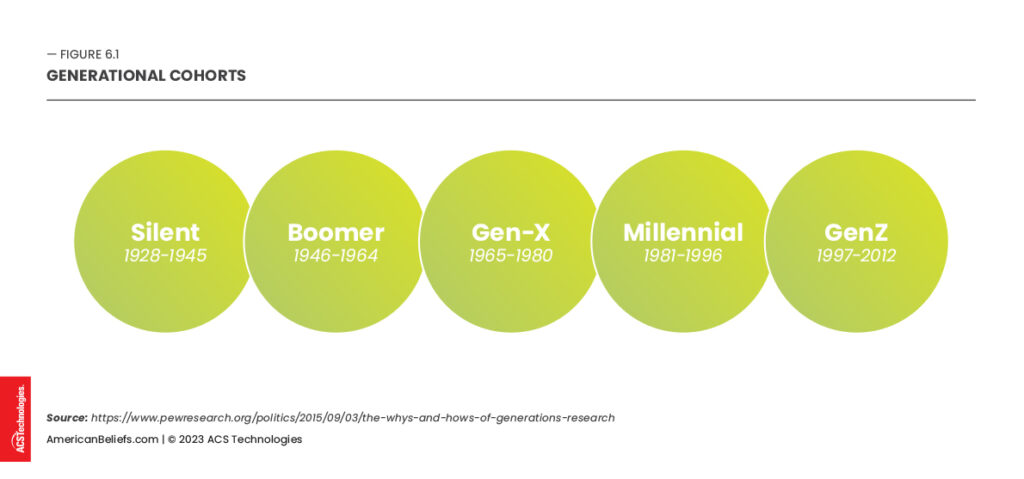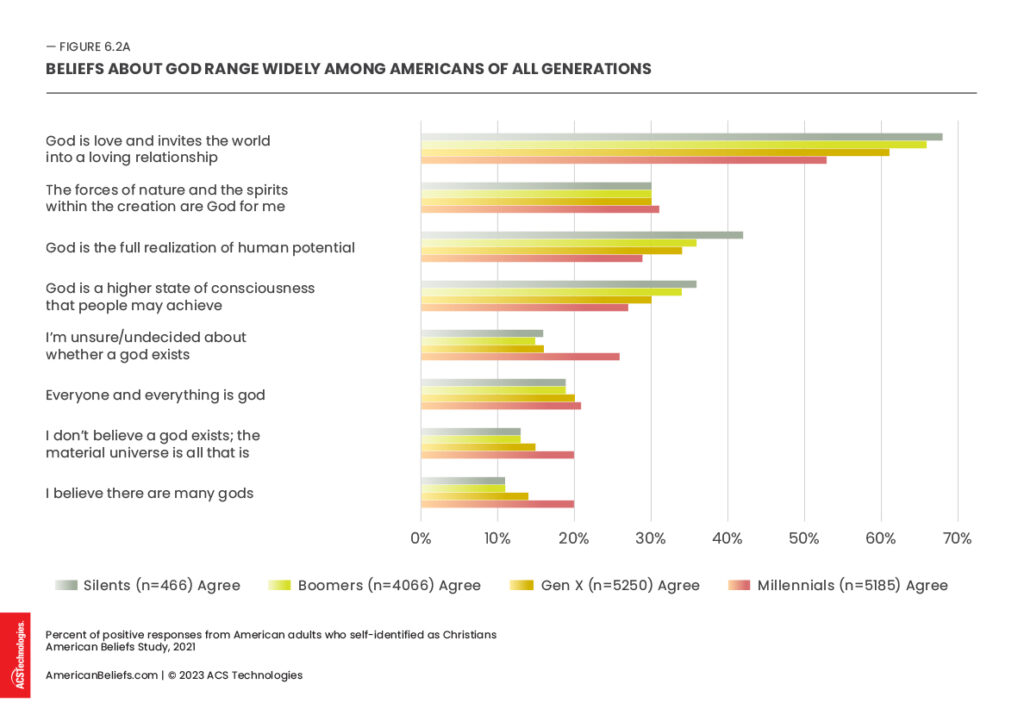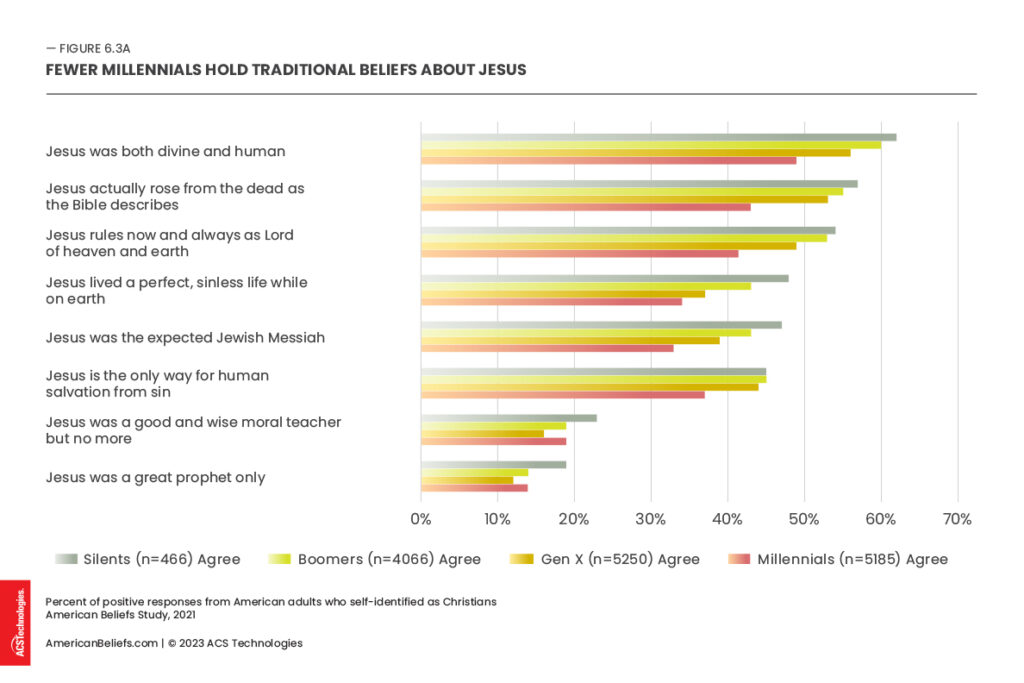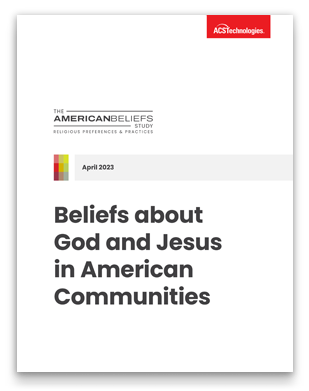More than half of Americans (55%) believe that “Jesus was both divine and human.” A majority (52%) also believe that he “actually rose from the dead as the Bible describes.” A smaller percentage (38%) would say he was “the expected Jewish Messiah,” or that he “lived a perfect, sinless life while on earth” (38%).
These findings were reported in an earlier article in this series. They are from the American Belief Study, which asked a carefully-designed, representative sample of 15,000 Americans about their religious beliefs and behaviors.
What people believe about God and Jesus sort out differently across the American landscape. There are differences by region, by urban/rural contexts, and by religious affiliation. It’s especially instructive to look at differences between generational cohorts.
We are all shaped by the culture we were born into, the culture we grew up in, and events of national significance that happened in our lives. American culture is not static. It’s changing all the time, and the pace of change has accelerated in recent decades. Americans born in the 1940s were shaped by a culture very different from that experienced by Americans born in the 1990s.

Figure 6.1 shows the specific generational cohorts adopted by the American Beliefs Study after the example set by the Pew Research Center. Note that when this Study was conducted, there were so few GenZ participants that they were added into the Millennial group.
What Do They Believe About God?
In the American Beliefs Study, survey respondents marked their level of agreement or disagreement with a list of statements about God using a five-point scale. Figure 6.2a shows the percentages that marked “Somewhat agree” or “Strongly agree.”

Much more than any other, participants agreed the most with the statement about God that is most in line with Christian faith. A majority of respondents, in all age cohorts, like the idea that “God is love.” They don’t see God as remaining distant, but as inviting the world to connect with him in love. Nearly seven in ten members of the Silent generation agreed (68%), Millennials agreed at a level 15 percentage points lower (53%), and the other two groups scored between, in order of age.
The other statements in the eight statements above all represent a departure from a Christian understanding of God. For two of the statements, responses sorted out in a way similar to the statement about God as love. The Silents showed the highest level of agreement with the two humanist statements, “God is the full realization of human potential,” and “God is a higher state of consciousness that people may achieve.” The youngest cohort, the Millennials, showed the lowest level of agreement with these statements.
This is surprising. Evidently, many people in these older cohorts carry a concept of God that mixes ideas from the Christian worldview with ideas from humanist thought. It’s not accurate to assume that all older Americans who believe in God believe in the God of the Bible. For fairly large percentages of them, their beliefs about God are at least mixed, and at most, a definite departure from a Christian understanding.
For the other five statements, Millennials stand out for their greater distance from Christian ideas about God.
Significantly more Millennials don’t believe in God, are unsure about the existence of God, or have a concept of God that is unlike the God of the Bible.
For three of the statements, their difference from the other age cohorts is substantial.
- Millennials are most likely to be “unsure\undecided” about the existence of God, by a gap of 10 to 11 percentage points.
- Millennials are most likely to believe “there are many gods,” by a gap of six to nine percentage points.
- Millennials are most likely to say, “I don’t believe a god exists,” by a gap of five to seven percentage points.
For two other statements, the gap is not as large, but the pattern holds, that Millennials, more than the other age cohorts, think of God in non-Christian ways.
- Millennials have the highest level of agreement with the pantheist concept, “Everyone and everything is God,” by a gap of one to two percentage points.
- Millennials have the highest level of agreement with the animist (or semi-animist) concept that God is “The forces of nature and the spirits within the creation,” by a gap of one percentage point.
What Do Americans Believe About Jesus?
The statements about Jesus in the Study offered many options that were in harmony with traditional Christian teaching, and two that were not. Figure 6.3a shows the percentages of respondents who chose “Somewhat agree” or “Strongly agree.”

Interestingly, the statements about Jesus that departed from Christian understanding, asserting that Jesus was no more than a good moral teacher or that he was no more than a great prophet, got the lowest positive response, from all age cohorts.
When it comes to beliefs about Jesus, Millennials are clearly in a different place than the older groups.
- On the statement, “Jesus is the only way for human salvation from sin,” the three older cohorts clustered tightly, at 44-45% agreement. The Millennials lagged seven percentage points behind the pack.
- On the statement, “Jesus actually rose from the dead as the Bible describes,” the three older cohorts were within four percentage points of each other, and all above 50%. Only 43% of the Millennials agreed, a gap of ten percentage points from the rest.
- On the statement, “Jesus was both divine and human,” the other groups agreed at a level of 56% or more, with nearly two out of three Silents agreeing. Less than half the Millennials agreed (49%).
This pattern also holds for the other three statements that affirm basic Christian teaching about Jesus. With every statement, Millennial respondents agreed at the lowest rate of all the age cohorts, usually by a significant gap.
What the Millennial generation tends to believe about Jesus is significantly farther from Christian faith than the beliefs of any other generation.
A majority of Silents, Boomers, and Gen Xers believe that Jesus was both divine and human—but not the Millennials.
A majority of Silents, Boomers, and Gen Xers believe Jesus rose from the dead—but not the Millennials.
And majority of Silents and Boomers, and 49% of Gen Xers, believe “Jesus rules now and always as Lord of heaven and earth”—but not the Millennials.
Almost without exception, the older the generation, the higher the percentage that agrees with Christian teaching about Jesus. The younger the generation, the more their beliefs depart from Christian teaching about Jesus. On statements that agree with the Bible’s teaching about Jesus, more Silents agree than Boomers, more Boomers agree than Gen Xers, and more Gen Xers agree than Millennials—with the last comparison showing the widest gap.
Something happened in American culture, most likely a combination of many forces, that moved the Millennial generation further away from Christian understanding and faith, especially when it comes to the question of who Jesus was and the meaning of his life. Churches seeking to serve and witness to this generation confront a significantly-different set of beliefs than with prior age cohorts.
Key Findings:
- More than the other generational cohorts, many Silents tend to see God in humanist terms, as “the full realization of human potential,” or as “a higher state of consciousness that people may achieve.”
- There are many more atheists, and people unsure about the existence of God, among the Millennials than any other generation.
- Many Millennials hold pantheist or animist concepts of God.
- Millennials differ from the other age cohorts in what they believe about God, but they differ greatly from the other age cohorts in what they believe about Jesus. In both cases, significantly more of them hold to beliefs that depart from traditional Christian understanding.
Ideas for Your Church:
- Recognize that the Millennial generation is different. Witness to unchurched Millennials, and discipleship of churchgoing Millennials, must work from a different starting place of understanding, especially about Jesus.
- When teaching or preaching about God and Jesus, be aware that significant percentages of Americans, especially younger citizens, hold to beliefs different from the Christian understanding.
- Choose apologetic books and resources that speak effectively to a wide range of non-Christian belief systems, and that make clear the distinctive positions of Christianity.
About this study
This online study among 14,942 American adults was conducted by Campbell Rinker for ACST from October 2020 through February 2021. Results were balanced by US region, 19 ‘Mosaic’ demographic clusters from Experian. They were weighted by age to align with known population characteristics. The study carries a maximum margin of error of ±1.97% at the 95% confidence level within any US Census region. A comparative 2017 study involved the same size audience.
FREE REPORT
Provides Actionable Data on American Religious Life
In this report, you’ll discover:
- The activity level of Americans in local religious communities and how it has changed over the past decade.
- The most pressing concerns Americans face today, are concerns that will impact how you reach out to your community.
- Good news and bad news about the theological beliefs of Americans. And how they view places of worship in their community.
About the Authors
Dirk Rinker is president and CEO of Campbell Rinker, which has been a leading market researcher for nonprofits since the early 1990s. He has designed and implemented research projects for hundreds of ministries, charities, universities, and museums in the U.S. and internationally. Helping clients understand and act on the attitudes, motivations and perceptions of their valuable constituencies.
Michael Jaffarian is a researcher, writer, and consultant to nonprofits. He and his wife were missionaries for 33 years, serving in Singapore, Virginia, Los Angeles, and England. Most of his ministry has been in global mission research. He has studied, and written on, growth trends among tens of thousands of Christian denominations globally.





